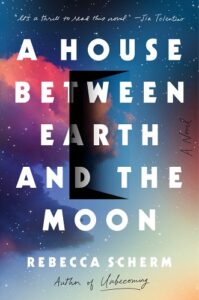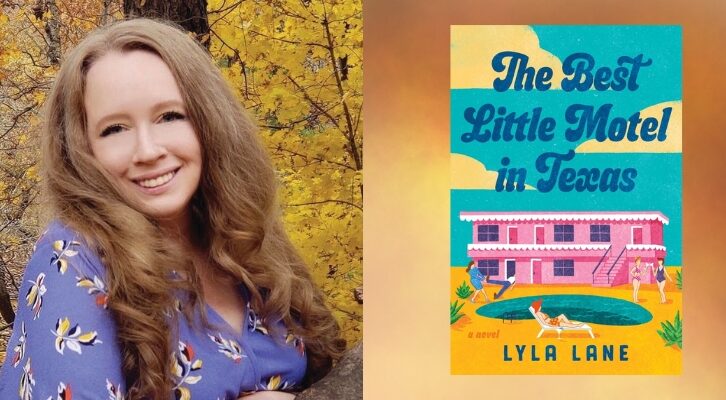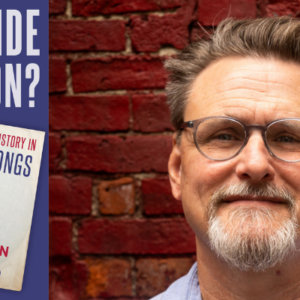
Writing Climate Fiction Showed Me That a Different Life is Possible
Rebecca Scherm on Looking a Terrifying Future in the Face
In 2014, pregnant with my first child and freaking out, I thought I’d work through my fears by writing a novel that imagined the future. Writing has always helped me—not to calm myself, exactly, but to run my imagination all the way out, until it exhausts itself.
In particular, I was worried about the climate crisis, guns, and billionaires. I worried I wouldn’t be a good enough mother; and that even if I were a great mother, it wouldn’t be enough to make up for the fact that I had brought him the world, knowing what I did about climate change and other downfalls of late-stage capitalism. Beset with a useless, existential urge to flee—to New Zealand, to the moon—I started a story about a family in 2033 who moves to a space station.
Climate change was still abstract to me then—numbers, reports, bad stuff far away. I knew about the 2-degree rise and that California was always on fire. In a novel, however, willful vagueness doesn’t cut it. To write convincingly about the near future, I had to read a lot that I’d avoided—unconsciously, perhaps, so that I could choose to have children.
As you might expect of a pregnant person trying to write in vivid, frightening detail about the crisis her child would grow up in, this didn’t go well. If the writing was good, I was wreck. Every worry, regret, and fear I had known in my life flew back to me to land, claws in, until I was a pair of eyes looking out through dark feathers. If I was okay, the writing wasn’t, my characters sidestepping every fear and tension.
I’m braver than I was before I wrote this book, less willing to wring my hands or avert my eyes.
When I had my baby, I learned how much abstraction I’d still clung to. Once my son was real, every conceivable crisis was real, too.
*
I fell behind. Too much time passed, and my editor asked to see my first hundred pages. After she read them she called me, encouraging, but a little tender, worried. It was so dark, she said. Maybe let a little light in? After we hung up, I cried, unexpectedly relieved. I let in some light, then too much light, had a couple miscarriages and got addicted to adding more light. I wrapped the story in layers of down for a softer landing.
Then, I had a new editor. She thought I should read more detailed analyses about the climate crisis. The book seemed to sidestep the main disasters, and my death counts seemed low to her.
What you can’t say, when you have promised a book like this, is that you don’t want to know any more.
*
My first book took me three years and change to write; this one took me seven. The world I wrote it in was louder and crowded with life and change, both in my own home and outside it. I had a child, we moved to another city; had miscarriages; we moved across the country, had a second child, then the pandemic years, annual California fire seasons: real life.
I worried all the time that I wasn’t working fast enough, that I’d be scooped. Not by another writer—many people smarter than me are writing about the collision of the climate crisis with personal technology and technocracy, the money that makes the rules—that was a given. Instead, I worried about being scooped by reality. The present was changing too fast for me to keep up. In the earliest version of my book, the privacy-shattering technology I “invented” was on the shelves before I finished the draft.
Even once I understood that I needed to run my imagination much further, much faster, the world outside kept catching up. 2.6 billion people make new realities a lot faster than one woman with part-time childcare. When the wonders and terrors that became real were the same ones that I had imagined, I wasn’t so much surprised as defeated. As a writer, I felt like I had gotten it right, but too late. As a mother, I hated it.
Once, I came home from a masked and socially-distanced Black Lives Matter protest to find my husband and children watching the launch of SpaceX’s Crew Dragon on a laptop on the floor. Our son was five, in thrall to space travel, and our daughter was an infant, wide-eyed at the light of the laptop screen. I set down my picket sign. “She shouldn’t be seeing this,” I said.
My husband turned around. “Why?”
Because babies aren’t supposed to watch screens before they are two years old. I realized the dumb desperation of holding that line at this particular moment and didn’t answer, just sat down to watch with them. Protesting that Black lives matter at a busy intersection while my kids watched Space-X launch a useful tool for human escape—temporary, costly, and ticketed, but escape nonetheless? The convergence of these instances seemed important.
I don’t confuse my book for action, and if it’s a call to action, the first person to hear it was me.
I wrote this scene into my novel. My editor took it out: too on the nose. She was right. This was one of those instances when the collisions and coincidence of real life are too perfect for fiction. When fictional situations line up so neatly that meaning is inescapable, it’s overbearing, and we don’t like it.
*
Each time I’ve set out to write a book, I have hoped that writing it would change me. With my new novel, A House Between Earth and Moon, I was asking for a lot of change, because the stakes in my fictional future world are the stakes of my real one. The children in my novel are the same generation as my own children, and the book and its author wanted to know if they are going to be okay.
I have been thinking about the year 2033 for seven years, both as a writer and as a mother. At the end of my day’s worktime, I’d push my chair back to leave the near future I was writing to reunite with the near future I was raising, the near future building a LEGO catapult in the garage and the near future who woke up cranky from her nap and doesn’t like the way her babysitter has peeled an orange. I shout their names as if I’ve been away for days, pick them up and swing them around, press my daughter’s jam-sticky cheek against mine, and try to shake off the future.
Writing this book took me, as they say, to a dark place, but its characters, both those who act and those who fail to, led me out of it. The ending of this book was for the book, but after I wrote it, I experienced it as a kind of rebuke to myself. This novel changed me from someone who writes about a need for change into someone desperate to bring those changes to life. I started down a path of climate activism through native plant gardening—for biodiversity, for carbon capture, for reacquainting people with the more-than-human world around them—and this path has felt like a kind of salvation. I’m braver than I was before I wrote this book, less willing to wring my hands or avert my eyes. I don’t confuse my book for action, and if it’s a call to action, the first person to hear it was me.
__________________________________

A House Between Earth and the Moon by Rebecca Scherm is available via Viking.
Rebecca Scherm
Rebecca Scherm is the author of Unbecoming. She lives in California with her family.



















